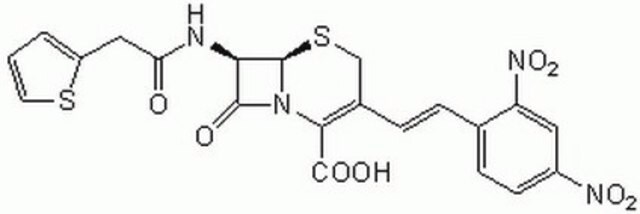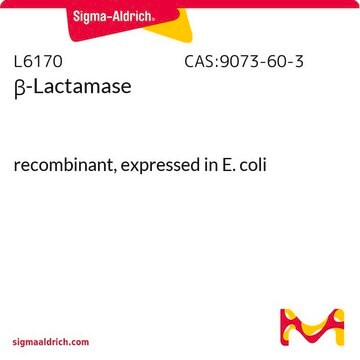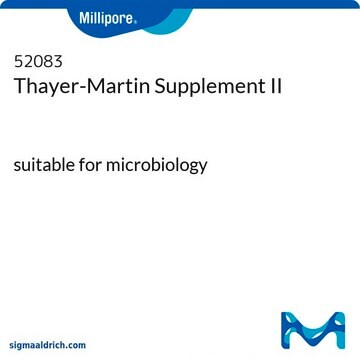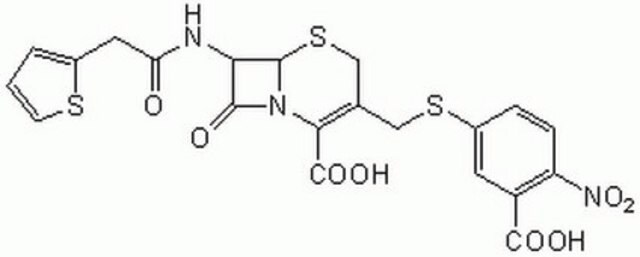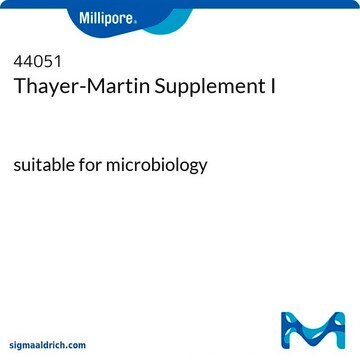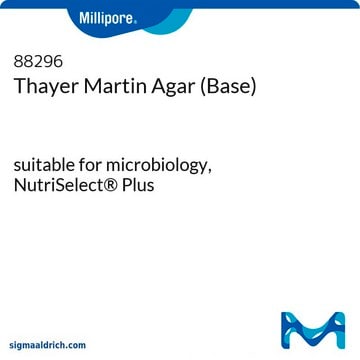Recommended Products
product line
BioChemika
shelf life
limited shelf life, expiry date on the label
technique(s)
microbe id | specific enzyme detection: suitable
application(s)
clinical testing
environmental
food and beverages
microbiology
storage temp.
−20°C
suitability
Moraxella spp.
Haemophilus spp. (species)
Neisseria spp.
Staphylococcus spp.
anaerobic bacteria
General description
Nitrocefin is a chromogenic cephalosporin, it has a characteristic beta-lactam ring which on oxidation by beta-lactamase, renders nitrocefin from yellow to red in color. It is light-sensitive in nature and is quite expensive. It is used for the rapid detection of beta-lactamase enzymes in isolated colonies of Neisseria gonorrhoeae, Moraxella catarrhalis, Staphylococcus spp., Haemophilus influenzae and anaerobic bacteria.
Application
For the rapid detection of beta-lactamase enzymes in isolated colonies of Neisseria gonorrhoeae, Moraxella catarrhalis, Staphylococcus spp., Haemophilus influenzae and anaerobic bacteria.
Components
50 disks in a light resistant plastic vial (6 mm diameter filter paper disks impregnated with Nitrocefin)
related product
Product No.
Description
Pricing
Storage Class Code
11 - Combustible Solids
WGK
WGK 3
Flash Point(F)
Not applicable
Flash Point(C)
Not applicable
Personal Protective Equipment
dust mask type N95 (US), Eyeshields, Gloves
Choose from one of the most recent versions:
Already Own This Product?
Find documentation for the products that you have recently purchased in the Document Library.
Customers Also Viewed
A Piekarowicz et al.
PloS one, 15(10), e0240579-e0240579 (2020-10-16)
All Neisseria gonorrhoeae strains contain multiple copies of integrated filamentous phage genomes with undefined structures. In this study, we sought to characterize the capsid proteins of filamentous N. gonorrhoeae bacteriophage NgoΦ6 and phagemids propagated in different bacteria. The data demonstrate
Elizabeth M Adamowicz et al.
The ISME journal, 12(11), 2723-2735 (2018-07-12)
Microbes frequently rely on metabolites excreted by other bacterial species, but little is known about how this cross-feeding influences the effect of antibiotics. We hypothesized that when species rely on each other for essential metabolites, the minimum inhibitory concentration (MIC)
Articles
For microbiologists the most fundamental stain was developed in 1884 by the Danish bacteriologist Hans Christian Gram.
Our team of scientists has experience in all areas of research including Life Science, Material Science, Chemical Synthesis, Chromatography, Analytical and many others.
Contact Technical Service